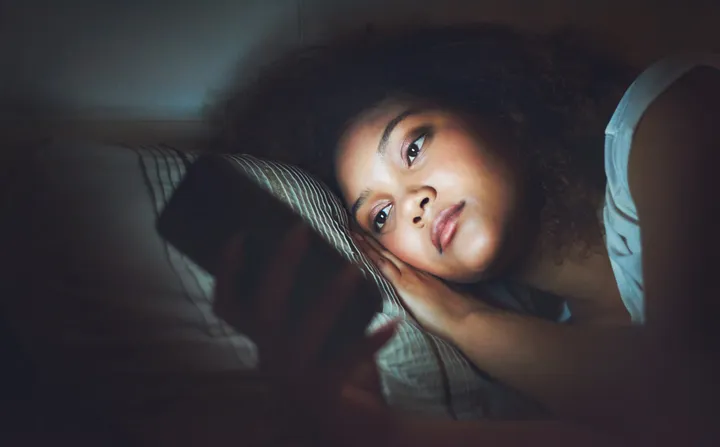The vast majority of people use their smartphones before going to bed, and many even use their phones in bed. According to a 2019 study by Common Sense Media, 61% of parents use their phones within half an hour before bed, and about 70% of children check their phones during this time.
Although many people play with their phones before going to bed, most people are still able to fall asleep. What keeps us awake at night is not the behavior of playing on mobile phones before going to bed, but the type of content consumed before going to bed that affects the quality of the night’s rest.
Checking into something you know will stress you out can lead to a restless night. Alternatively, using your phone as a soothing tool or way to end your day can also help you fall asleep.
Below, sleep experts share the dos and don’ts on your phone to help you get a restful night’s sleep.
Be intentional about the notifications that you check
It is recommended to use your phone before bed as a summary tool at the end of the day. Check tomorrow’s weather, ask a friend a question, or choose a workout you want to do in the morning.
Whatever you do, don’t check for notifications that you know will stress you out, such as news updates or emails. Pay attention to the alarms that catch your attention and whether they promote a restful sleep.
Use apps and settings that shift your phone screen’s hue to a warmer color around bedtime
The most disturbing thing about screens is that when they are at their highest brightness, they emit colors that are close to the natural light in our environment.
Specifically, the blue light emitted by mobile phone screens can have the same physiological alarm effect on the body and brain as the sun.
Many phones have settings that automatically change the tint of the screen. On the iPhone, the feature is called Night Shift, and on Samsung phones, the Blue Light Filter setting does the same thing. On other Android phones, this setting is called Night Light. If your phone doesn’t offer this setting, there are free apps you can download that can adjust your phone’s tint as you get closer to bedtime.
Changing your phone’s preprogrammed blue setting to a warmer tone can help you feel sleepy and relaxed. It’s recommended to switch settings around the time the sun sets or an hour or two before bed.
Be careful about mindless social media scrolling
About 7 in 10 Americans use social media. While checking Twitter or Instagram before bed isn’t inherently a bad thing, using social media before bed can lead to a restless night.
One of the hardest things about social media is that you lose control. This means that while you can choose who you are friends with on Facebook, you have no control over what they post, the targeted ads or news updates that appear in your feed, or whether someone posts something that upsets you.
Since we can’t select everything we see on social media, it may not always show you sleep-friendly content. If you like to check social media before bed, try checking out specific accounts that you know will bring you peace (like some of these mental health Instagram accounts). Otherwise, save the application to earlier in the day if you can.
Try out a meditation app
Using your phone in bed is no reason to be ashamed. Many people use meditation apps as a way to fall asleep. He points out that in this case, the cell phone is more than just a phone, it’s also a useful sleep tool.
Downloadable meditation apps like Headspace, Shine, and Calm teach newbies how to meditate and the importance of the practice, and provide meditation guidance for users of all levels.
Listen to stories on your phone before bed
Stories are one of the forms of information we receive at a very, very young age, so we are programmed to tell them before bed.
You can download storytelling programs on your smartphone to help you fall asleep easily. Apps such as Audible and Libby allow users to download a range of audiobooks for listening, including bestsellers, children’s books, non-fiction and short story collections.
Set an alarm for bedtime
Take advantage of your phone’s alarm clock feature by setting a bedtime alarm. That way, if you’re stuck on social media when you should be getting ready for bed, a nighttime alarm can remind you to stop scrolling.
If you set a soothing alarm for bedtime, it can help you be more aware of when you should start cutting off. Unplugging could mean meditation, breath work, or falling into sleep.
Overall, try to use your phone as a tool to increase your sense of serenity
When it comes to smartphone use before bed, the end goal should be to gain a sense of calm after checking your phone. It would be great if meditating with it before bed could accomplish this. If watching TikTok helps you achieve this, that’s great.
If you’re worried about being late for work or missing your early flight, your cell phone can be a great tool. In this case, your phone can act as an alarm clock, helping you fall asleep knowing that you will be woken up at the necessary time in the morning.
If you use your phone as a tool to feel safe and prepare for a good night’s sleep (or a good night’s sleep), then using your phone before bed shouldn’t be a problem. If you use your phone to eliminate disturbing thoughts, you may not be able to enjoy a restful night’s sleep.
Those who use their phones right up until bedtime or even in bed should not be ashamed.If used correctly, it can be a useful tool for many people while they sleep.




